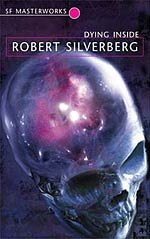
![]() davidpackwood1@gmail
davidpackwood1@gmail
7/4/2024
![]()
"Dying Inside" is that rare beast- a literary science fiction novel. Science fiction is often lauded as a vehicle for ideas, but seldom for its literariness. If it approaches that condition, then it's often gathered into the mainstream, and repudiated as a product of the SF genre. Silverberg manages to write a book that could fit into either mainstream or genre, with consummate ease. You get the feeling reading this book that producing something as well-crafted, erudite and moving as this is just a walk in the park for Silverberg. His Jewish outsider, David Selig, is a memorable creation, a New York archetype like Woody Allen or Herzog, with the trappings of science fiction. Selig is an intellectual cursed with the gift of telepathy; he can tap the brain chatter of siblings, friends, and most significantly, lovers. He also can occupy the brain space of animals and insects, leading to some really creepy ruminations on what its like to look into the mind of nature. Selig's life story and milieu is well fleshed out by Silverberg. We learn that Selig is a dropout from Columbia who is unable- or unwilling- to hold down paying jobs, maintain a stable relationship with women- the telepathy gets in the way- and who ekes out a living from ghosting term papers for lazy college students. There's an interesting, and ultimately resolved sub-plot involving his sister, Jude, who knows about Selig's gift. We also get the added edge of other telepaths in his orbit, like Tom Nyquist, a blonde, narcissistic type who peeps into the mind of the stock exchange to generate income. As the title suggests, the novel explores the dying of the light, the ebbing away of the telepathic gift, the fading out of the background din of mental conversation until silence prevails like the snow that symbolically appears throughout the novel. There's some really fine writing in this book, like the mock-tour of Selig's apartment with its strata of reading matter, that is used to show the breadth and depth of Selig's ultimately useless knowledge. You could read the book on several levels. Obviously it's a portrait of a telepath or mutant found within the terrain of science fiction; but it could equally be read as an indictment of modern man, the alienation that comes with realizing the hopelessness and futility of striving and ambition. Silverberg went on to create many fascinating new characters and worlds, but his David Selig stands as a salutary portrait of the gifted misfit, worthy of inclusion in the gallery of existentialist doomed anti-heroes, in science fiction or outside of it.